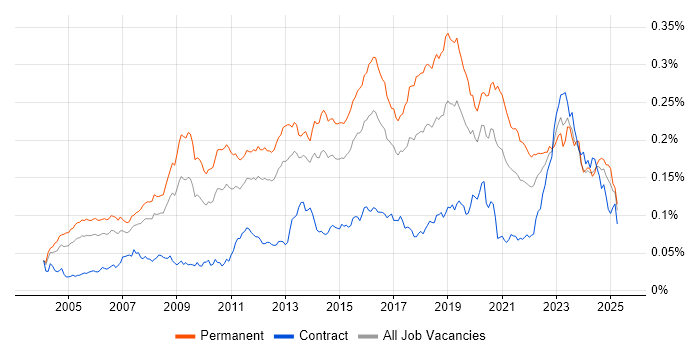Application Support Engineer
UK
The median Application Support Engineer salary in the UK is £45,000 per year, according to job vacancies posted during the 6 months leading to 6 May 2025.
The table below provides salary benchmarking and summary statistics, comparing them to the same period in the previous two years.
| 6 months to 6 May 2025 |
Same period 2024 | Same period 2023 | |
|---|---|---|---|
| Rank | 610 | 783 | 782 |
| Rank change year-on-year | +173 | -1 | +159 |
| Permanent jobs requiring an Applications Support Engineer | 80 | 131 | 185 |
| As % of all permanent jobs advertised in the UK | 0.15% | 0.13% | 0.18% |
| As % of the Job Titles category | 0.17% | 0.14% | 0.20% |
| Number of salaries quoted | 77 | 115 | 129 |
| 10th Percentile | £31,250 | £26,750 | £29,950 |
| 25th Percentile | £35,000 | £31,250 | £32,500 |
| Median annual salary (50th Percentile) | £45,000 | £40,000 | £45,000 |
| Median % change year-on-year | +12.50% | -11.11% | +5.88% |
| 75th Percentile | £53,750 | £61,250 | £57,500 |
| 90th Percentile | £66,250 | £70,000 | £66,250 |
| UK excluding London median annual salary | £42,000 | £37,500 | £35,000 |
| % change year-on-year | +12.00% | +7.14% | -12.50% |
All Permanent IT Job Vacancies
UK
For comparison with the information above, the following table provides summary statistics for all permanent IT job vacancies. Most job vacancies include a discernible job title that can be normalized. As such, the figures in the second row provide an indication of the number of permanent jobs in our overall sample.
| Permanent vacancies in the UK with a recognized job title | 48,283 | 93,229 | 94,684 |
| % of permanent jobs with a recognized job title | 90.44% | 94.63% | 91.53% |
| Number of salaries quoted | 27,442 | 66,845 | 59,589 |
| 10th Percentile | £30,000 | £28,500 | £32,500 |
| 25th Percentile | £42,000 | £38,500 | £45,000 |
| Median annual salary (50th Percentile) | £57,500 | £52,500 | £60,000 |
| Median % change year-on-year | +9.52% | -12.50% | - |
| 75th Percentile | £75,000 | £71,250 | £81,250 |
| 90th Percentile | £97,500 | £90,000 | £100,000 |
| UK excluding London median annual salary | £52,000 | £50,000 | £53,000 |
| % change year-on-year | +4.00% | -5.66% | +6.00% |
Applications Support Engineer
Job Vacancy Trend
Job postings that featured Applications Support Engineer in the job title as a proportion of all IT jobs advertised.

Applications Support Engineer
Salary Trend
3-month moving average salary quoted in jobs citing Applications Support Engineer.
Applications Support Engineer
Salary Histogram
Salary distribution for jobs citing Applications Support Engineer over the 6 months to 6 May 2025.
Applications Support Engineer
Top 14 Job Locations
The table below looks at the demand and provides a guide to the median salaries quoted in IT jobs citing Applications Support Engineer within the UK over the 6 months to 6 May 2025. The 'Rank Change' column provides an indication of the change in demand within each location based on the same 6 month period last year.
| Location | Rank Change on Same Period Last Year |
Matching Permanent IT Job Ads |
Median Salary Past 6 Months |
Median Salary % Change on Same Period Last Year |
Live Jobs |
|---|---|---|---|---|---|
| England | +136 | 77 | £45,000 | +5.88% | 49 |
| UK excluding London | +181 | 60 | £42,000 | +12.00% | 32 |
| Work from Home | +131 | 29 | £50,000 | +17.65% | 38 |
| South East | +91 | 27 | £50,000 | +17.65% | 14 |
| London | +93 | 16 | £65,000 | +8.33% | 26 |
| Midlands | +46 | 15 | £52,500 | +84.21% | 6 |
| West Midlands | +57 | 9 | £62,500 | +106.61% | 4 |
| North of England | +67 | 8 | £35,349 | -0.43% | 4 |
| Yorkshire | +78 | 7 | £35,000 | -12.50% | 2 |
| East of England | +51 | 7 | £42,000 | +14.29% | 5 |
| East Midlands | +28 | 6 | £32,500 | +14.04% | 2 |
| South West | +105 | 2 | £46,250 | +32.14% | 1 |
| Wales | +38 | 1 | £45,000 | -5.26% | 3 |
| North West | +14 | 1 | £35,698 | +15.15% | 2 |
Applications Support Engineer Skill Set
Top 30 Co-occurring Skills and Capabilities
For the 6 months to 6 May 2025, Applications Support Engineer job roles required the following skills and capabilities in order of popularity. The figures indicate the absolute number co-occurrences and as a proportion of all permanent job ads featuring Applications Support Engineer in the job title.
|
|
Applications Support Engineer Skill Set
Co-occurring Skills and Capabilities by Category
The follow tables expand on the table above by listing co-occurrences grouped by category. The same employment type, locality and period is covered with up to 20 co-occurrences shown in each of the following categories:
|
|
|||||||||||||||||||||||||||||||||||||||||||||||||||||||||||||||||||||||||||||||||||||||||||||
|
|
|||||||||||||||||||||||||||||||||||||||||||||||||||||||||||||||||||||||||||||||||||||||||||||
|
|
|||||||||||||||||||||||||||||||||||||||||||||||||||||||||||||||||||||||||||||||||||||||||||||
|
|
|||||||||||||||||||||||||||||||||||||||||||||||||||||||||||||||||||||||||||||||||||||||||||||
|
|
|||||||||||||||||||||||||||||||||||||||||||||||||||||||||||||||||||||||||||||||||||||||||||||
|
|
|||||||||||||||||||||||||||||||||||||||||||||||||||||||||||||||||||||||||||||||||||||||||||||
|
|
|||||||||||||||||||||||||||||||||||||||||||||||||||||||||||||||||||||||||||||||||||||||||||||
|
|
|||||||||||||||||||||||||||||||||||||||||||||||||||||||||||||||||||||||||||||||||||||||||||||
|
|
|||||||||||||||||||||||||||||||||||||||||||||||||||||||||||||||||||||||||||||||||||||||||||||
